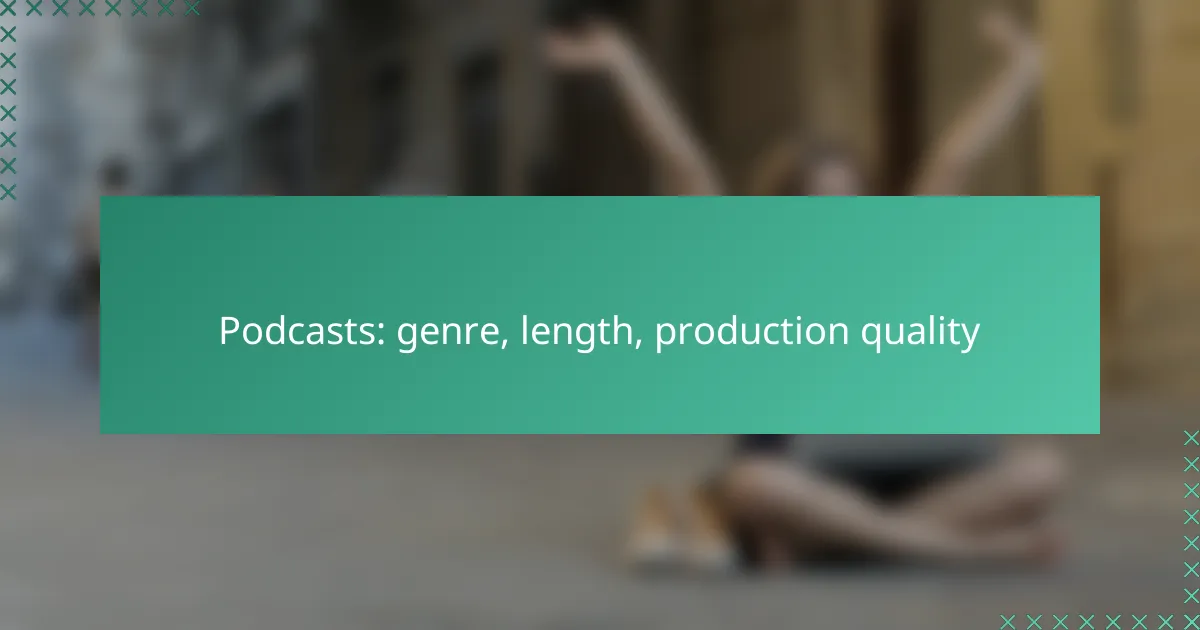Podcasts have become a diverse medium, with popular genres in the UK including true crime, comedy, news, and health. The ideal episode length generally falls between 20 to 60 minutes, striking a balance between depth and listener engagement. Additionally, production quality, shaped by audio equipment and editing skills, significantly affects the overall experience for audiences.

What are the popular podcast genres in the UK?
In the UK, popular podcast genres include true crime, comedy, news and politics, business, and health and wellness. Each genre attracts different audiences and offers unique content styles, making them appealing for various listeners.
True crime
True crime podcasts are among the most popular in the UK, captivating audiences with real-life crime stories and investigations. They often include interviews with experts, law enforcement, and victims, providing a comprehensive view of each case.
Listeners are drawn to the suspense and intrigue, which can lead to binge-listening sessions. Popular examples include “My Favorite Murder” and “Casefile,” which have garnered large followings.
Comedy
Comedy podcasts are designed to entertain and amuse, often featuring stand-up routines, humorous discussions, and comedic storytelling. They appeal to a wide audience looking for light-hearted content to brighten their day.
Shows like “The Last Podcast on the Left” and “No Such Thing As A Fish” are examples that blend humor with engaging topics, making them popular choices for listeners seeking laughter.
News and politics
News and politics podcasts provide listeners with insights into current events, political analysis, and expert opinions. These podcasts are essential for those wanting to stay informed about local and global issues.
Popular options include “The News Agents” and “The Political Party,” which offer diverse perspectives and in-depth discussions, catering to listeners who want to engage with the political landscape.
Business
Business podcasts focus on entrepreneurship, finance, and industry trends, appealing to professionals and aspiring entrepreneurs. They often feature interviews with successful business leaders and practical advice for listeners looking to grow their careers.
Examples like “The Tim Ferriss Show” and “How I Built This” provide valuable insights and inspiration, making them essential for anyone interested in the business world.
Health and wellness
Health and wellness podcasts cover topics such as mental health, fitness, nutrition, and holistic living. They aim to educate and motivate listeners to lead healthier lifestyles.
Popular shows like “Feel Better, Live More” and “The Mindful Kind” offer practical tips and expert interviews, helping listeners navigate their health journeys effectively.
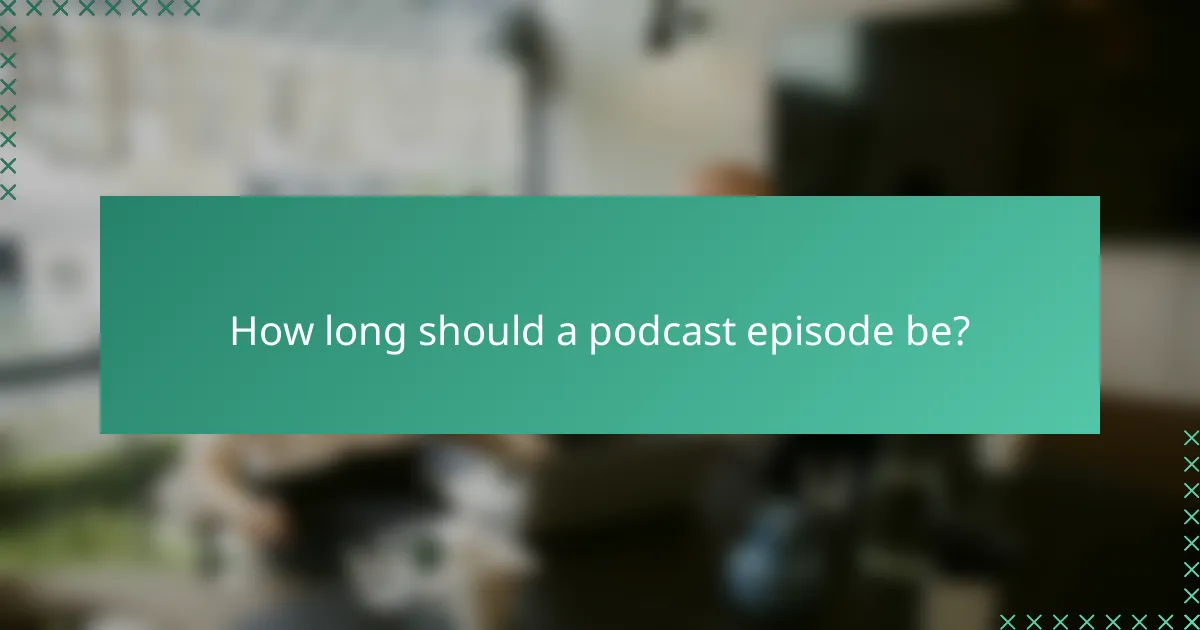
How long should a podcast episode be?
The ideal length for a podcast episode typically ranges from 20 to 60 minutes, depending on the content and audience preferences. This duration allows for in-depth exploration of topics while maintaining listener engagement.
Average length is 20-60 minutes
Most podcasts fall within the 20 to 60-minute range, striking a balance between providing valuable content and keeping the audience’s attention. Episodes around 30 to 40 minutes are particularly popular, as they fit well into daily routines like commuting or exercising.
When determining the length, consider your target audience’s habits and the complexity of the topics discussed. Longer episodes may be suitable for in-depth interviews or storytelling, while shorter ones can focus on quick tips or news updates.
Short-form podcasts under 20 minutes
Short-form podcasts, typically under 20 minutes, cater to listeners seeking quick, digestible content. These episodes are ideal for busy individuals who prefer to consume information in brief segments.
Examples include daily news briefings or quick tutorials. When creating short-form content, focus on delivering concise, impactful messages that resonate with your audience without unnecessary filler.
Long-form podcasts over 60 minutes
Long-form podcasts, exceeding 60 minutes, allow for extensive discussions and deep dives into complex subjects. These episodes are often favored by niche audiences who enjoy detailed analysis and storytelling.
While producing long-form content, ensure that the material remains engaging throughout. Break up the conversation with segments, guest interviews, or listener questions to maintain interest and provide variety.
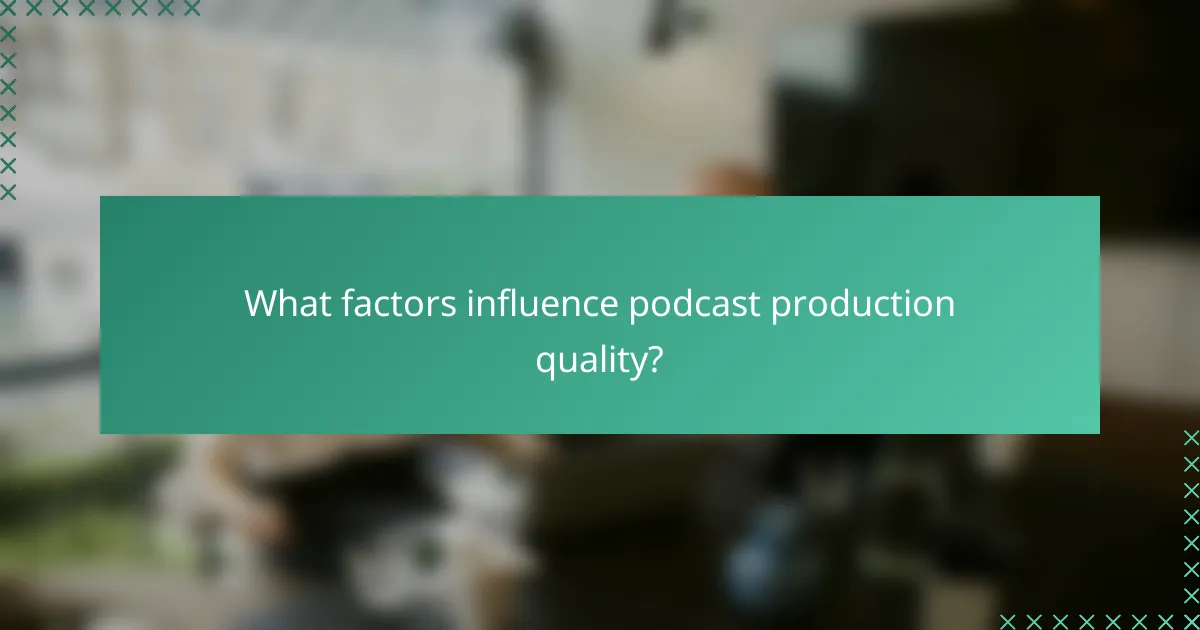
What factors influence podcast production quality?
Podcast production quality is influenced by several key factors, including audio equipment, editing software, and the experience of the host. Each of these elements plays a crucial role in determining the overall sound and feel of the podcast, impacting listener engagement and satisfaction.
Audio equipment quality
The quality of audio equipment significantly affects podcast production quality. High-quality microphones, headphones, and audio interfaces can enhance clarity and reduce background noise. Investing in equipment that meets industry standards can lead to a more professional sound.
For example, dynamic microphones are often preferred for voice recording as they minimize ambient noise, while condenser microphones capture a broader frequency range. A budget of a few hundred dollars can secure decent equipment for beginners, while professionals might spend thousands for top-tier gear.
Editing software usage
Editing software is essential for refining podcast audio and ensuring a polished final product. Programs like Audacity, Adobe Audition, and GarageBand offer various tools for cutting, mixing, and enhancing sound quality. Familiarity with these tools can drastically improve the editing process.
When selecting software, consider your budget and technical skills. Many free options provide sufficient features for beginners, while paid software often includes advanced capabilities for experienced editors. Regularly updating software can also help maintain compatibility and access new features.
Host experience
The experience of the podcast host can greatly influence production quality. A seasoned host is typically more comfortable with pacing, tone, and audience engagement, which can lead to a more enjoyable listening experience. Their ability to handle interviews and discussions can also enhance content depth.
New hosts may benefit from practice and feedback to improve their delivery and confidence. Joining podcasting workshops or online courses can provide valuable insights and techniques. Ultimately, a well-prepared host can elevate the overall quality of the podcast, making it more appealing to listeners.
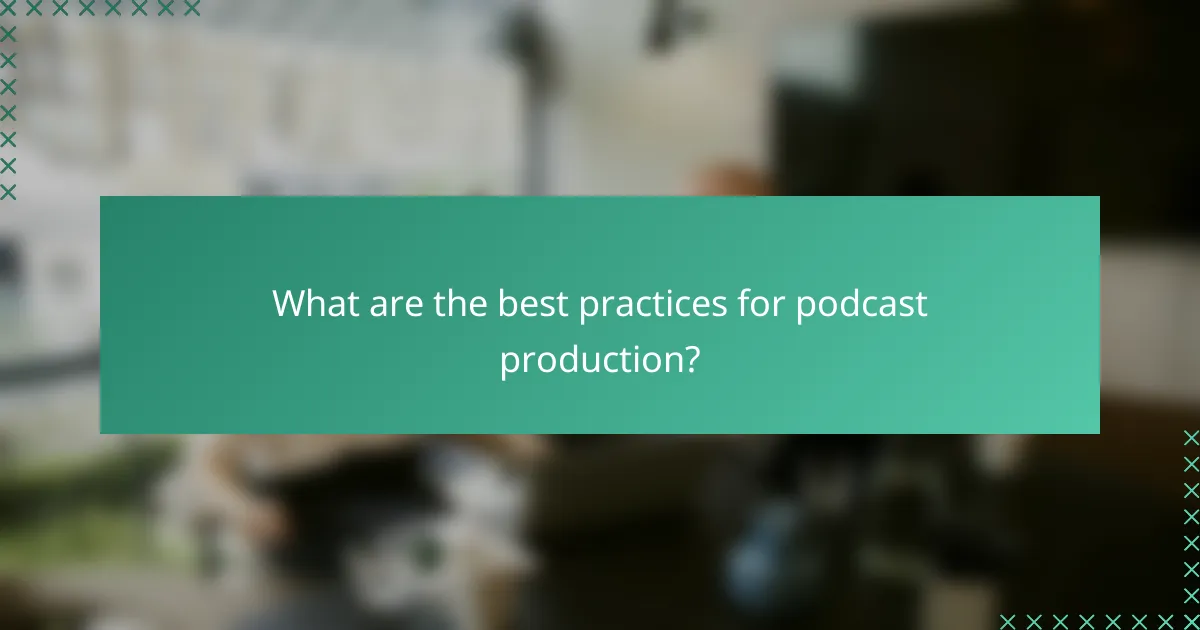
What are the best practices for podcast production?
Best practices for podcast production focus on quality content, sound, and consistency. By prioritizing these elements, creators can enhance listener engagement and build a loyal audience.
Scriptwriting and planning
Effective scriptwriting and planning are crucial for a polished podcast. Start by outlining your main topics and key points to ensure a coherent flow. Consider drafting a full script or bullet points to guide your discussion, which helps maintain focus and clarity.
Additionally, plan for segments such as interviews, listener questions, or storytelling. This structure can keep episodes dynamic and engaging, catering to various listener preferences.
Sound design and effects
Sound design and effects significantly enhance the listening experience. Invest in quality microphones and audio editing software to achieve clear sound. Background music and sound effects can add depth, but use them sparingly to avoid overwhelming the dialogue.
Consider the genre of your podcast when selecting sound elements. For instance, a true crime podcast may benefit from suspenseful music, while a comedy podcast might use lighter, upbeat tunes. Always ensure that sound levels are balanced for optimal clarity.
Consistent release schedule
Maintaining a consistent release schedule is vital for audience retention. Decide on a frequency that suits your production capacity, whether it’s weekly, bi-weekly, or monthly. Consistency helps listeners know when to expect new content, fostering loyalty.
Communicate your schedule clearly through your podcast and social media channels. If you need to adjust your release timeline, inform your audience in advance to manage their expectations effectively.
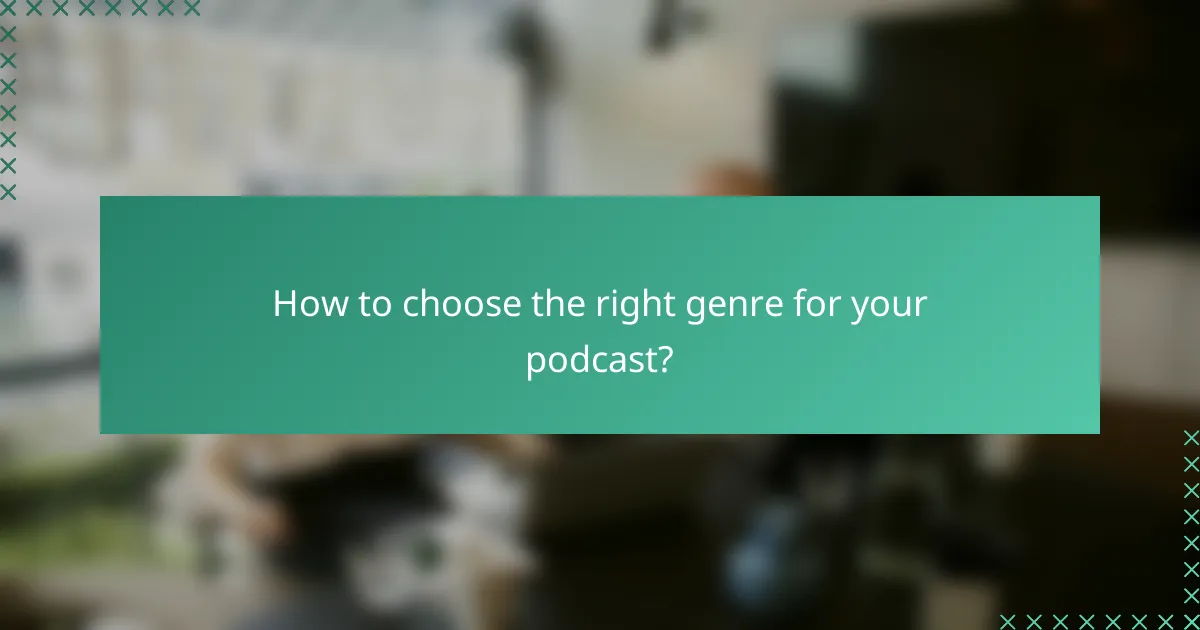
How to choose the right genre for your podcast?
Choosing the right genre for your podcast is crucial as it influences your content, audience engagement, and growth potential. Consider your interests, audience preferences, and current market trends to find a genre that resonates with both you and your listeners.
Identify target audience
Understanding your target audience is essential for selecting a podcast genre. Consider demographics such as age, gender, interests, and listening habits. For instance, a podcast aimed at young professionals might focus on career development or technology trends.
Engage with potential listeners through social media or surveys to gather insights about their preferences. This feedback can guide you in choosing a genre that appeals to your audience’s interests and needs.
Research market trends
Market trends can significantly impact the success of your podcast genre. Analyze popular genres and successful podcasts in your niche to identify what resonates with listeners. Genres like true crime, personal finance, and health and wellness have seen substantial growth in recent years.
Utilize platforms like Spotify or Apple Podcasts to explore trending shows and categories. This research can help you pinpoint gaps in the market or emerging topics that could attract a dedicated audience.
Evaluate personal interests
Your personal interests and expertise should play a vital role in selecting a podcast genre. Choose a genre that you are passionate about, as this will keep you motivated and engaged in the long run. For example, if you enjoy storytelling, consider genres like fiction or narrative non-fiction.
Additionally, think about your unique perspective or experiences that can add value to your chosen genre. This authenticity can help differentiate your podcast in a crowded market and attract a loyal listener base.
